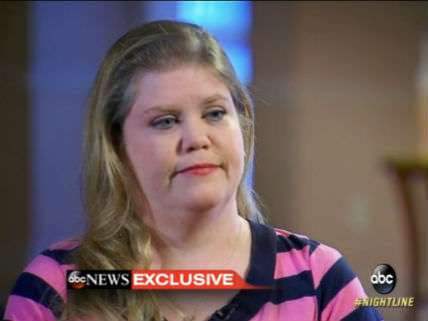Three Jurors Thought Michael Dunn's Self-Defense Story Was Plausible

A juror interview that ABC News aired last night sheds light on the disagreement that blocked a verdict on the murder charge against Michael Dunn and the reasoning that produced guilty verdicts on three attempted murder charges. Valerie, a home care nurse administrator also known as Juror No. 4, said that in the initial poll she and nine other jurors wanted to find Dunn guilty, apparently of first-degree murder, in the shooting of 17-year-old Jordan Davis following an argument over loud music at a Jacksonville gas station in November 2012. Two jurors believed Dunn had acted in self-defense, or at least that it was reasonable to believe he had. After 30 hours of deliberations over four days, the vote was 9 to 3 in favor of conviction, meaning an additional juror was persuaded that the prosecution had failed to prove its case on the murder charge.
Those three jurors need not have been convinced that Dunn was telling the truth—merely that his story was plausible, since the prosecution had the burden of proving beyond a reasonable doubt that Dunn did not act in self-defense. Furthermore, the three holdouts need not have thought Davis actually had a shotgun, as Dunn claimed. It would have been enough for them to think that Dunn, given the circumstances, could have reasonably believed Davis had a shotgun that he intended to use. As I point out in my column today, that is the sort of question faced by jurors across the country, regardless of whether their state imposes a duty to retreat on people who are attacked in public places.
When ABC's Byron Pitts asked Valerie why she and the other jurors in the majority were convinced of Dunn's guilt, she replied, "To me, it was unnecessary." From the excerpts shown on Nightline, it is not clear what Valerie meant by that. If she meant the shooting was unnecessary to prevent death or serious injury, she was zeroing in on the right question. But some of her other comments suggest she meant that Dunn, even assuming his account of the shooting is accurate, could have cut short the confrontation with Davis, thereby avoiding any need for violence:
Pitts: Why were you and the others so convinced that Dunn was guilty?
Valerie: We all believed that there was another way out, another option….
Pitts: You think Michael Dunn had options.
Valerie: Oh, yes, sir.
Pitts: What were his options?
Valerie: Roll your window up. Ignore the taunting. Put your car in reverse. Back up to the front of the store. Move a parking spot over. That's my feeling.
It may well be true that Dunn "had options" in this sense, but that is not the relevant question in determining whether the shooting was justified. If the argument Dunn could have avoided culminated in a credible death threat from an armed teenager, Dunn at that point (by his account) had no option but to fire his gun in self-defense. If Davis was the one who transformed a heated argument into a violent clash in which Dunn reasonably feared for his life, the shooting was legally justified even if Dunn could have defused the situation before then by swallowing his pride and retreating. And just to be clear: That sort of retreat is not what is at issue when we talk about the right to "stand your ground," which kicks in only after you are attacked. Even in states that require people in the latter situation to retreat (assuming they can do so safely), people are under no obligation to avoid merely verbal arguments.
As to why the jurors agreed that Dunn was guilty of attempted second-degree murder when he fired at the Dodge Durango in which Davis was riding, Valerie said they all concluded that Dunn, having already shot and killed Davis, crossed a line when he continued to shoot at the SUV as it pulled out of the gas station, thereby endangering the lives of the three other teenagers who were in the vehicle. "We had a lot of discussion on [Dunn] getting out of the car," she said, "and the threat is now gone, and yet your intent is still to go ahead and pursue this vehicle."
As I've said before, Dunn's story is awfully fishy, but I am not sure he was driven purely by anger, as the prosecution suggested. More likely he was genuinely afraid (which might have made him angry), but that does not mean his fear was reasonable. It seems quite unlikely that Davis was armed, since no one but Dunn reported seeing a gun, the teenagers did not return fire, the police did not find any weapons, Dunn never mentioned a gun to his girlfriend, and the only evidence on that score is Dunn's self-serving testimony. Maybe Dunn sincerely thought Davis was armed. But again, that does not mean Dunn's belief was reasonable.
In short, I could easily see convicting Dunn of manslaughter, which requires neither premeditation (an element of first-degree murder) nor "a depraved mind regardless of human life" (an element of second-degree murder), although his actions arguably indicated the latter. The manslaughter option was available to the jurors, but t is not clear from the interview with Valerie whether it was discussed.
